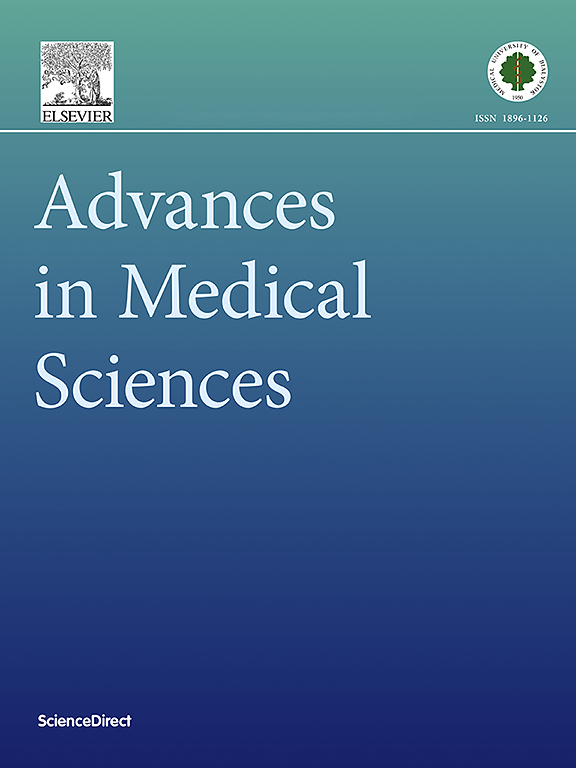Safety and efficacy of therapeutic plasma exchange in pediatric neuro-immunological diseases
IF 2.6
4区 医学
Q3 MEDICINE, RESEARCH & EXPERIMENTAL
引用次数: 0
Abstract
Purpose
Therapeutic plasma exchange (TPE) is the treatment of choice in various neuro-immunological disorders in pediatric populations. This study assesses the safety and efficacy of TPE in this demographic.
Materials and methods
A single-center, retrospective cohort study involving pediatric patients who experienced neuro-immunological events and underwent TPE procedures at a tertiary referral center was conducted.
Results
The study included 81 patients (Guillain-Barre: 65, polyneuropathies: 5, myasthenia gravis: 8, multiple sclerosis: 3), undergoing collectively 360 TPE procedures. Fresh frozen plasma (FFP) was used in 76.1 % of the TPE procedures. Adverse events (AEs) occurred in 50 % of TPEs using FFP compared to 39.5 % without. For procedures with at least two AEs, the rates were 24.5 % with FFP vs 8.1 % without. Incidence of allergic AEs was significantly higher in the FFP group (94.2 % of TPE with at least one AE) compared to those without FFP (47.2 %). Serious AE accounted for 1.2 % of TPE procedures and 2.5 % of patients. Effectiveness evaluations using a scale developed for this study and the Hughes Functional Grading Scale showed no significant clinical pre-treatment differences. After completing the treatment, children in the polyneuropathies group had the most severe clinical condition, and the largest relative improvement in clinical status was in the myasthenia gravis group.
Conclusions
TPE conducted by filtration is an effective and safe therapy for pediatric neuro-immunological diseases, with benefits outweighing the risks of complications. The use of FFP in therapy increases the probability of AE by 27 %, and significantly raises the risk of allergic and multiple AEs.
血浆置换治疗小儿神经免疫疾病的安全性和有效性。
目的:治疗性血浆置换(TPE)是儿科人群中各种神经免疫疾病的治疗选择。本研究评估了TPE在这一人群中的安全性和有效性。材料和方法:一项单中心、回顾性队列研究,涉及在三级转诊中心经历神经免疫事件并接受TPE手术的儿科患者。结果:81例患者(吉兰-巴雷综合征65例,多发性神经病变5例,重症肌无力8例,多发性硬化症3例)共接受了360例TPE手术。76.1%的TPE手术采用新鲜冷冻血浆(FFP)。与未使用FFP的39.5%相比,使用FFP的tpe中有50%发生不良事件(ae)。对于至少有两次ae的手术,有FFP的发生率为24.5%,而没有FFP的发生率为8.1%。FFP组过敏性不良事件的发生率(94.2%)明显高于无FFP组(47.2%)。严重AE占TPE手术的1.2%,占患者的2.5%。使用为本研究开发的量表和Hughes功能分级量表进行的有效性评估显示,临床治疗前无显著差异。治疗结束后,多神经病变组患儿临床状况最严重,重症肌无力组患儿临床状况相对改善最大。结论:滤过式TPE治疗小儿神经免疫疾病是一种安全有效的治疗方法,其益处大于并发症的风险。使用FFP治疗可使AE的发生概率增加27%,并显著增加过敏和多发AE的发生风险。
本文章由计算机程序翻译,如有差异,请以英文原文为准。
求助全文
约1分钟内获得全文
求助全文
来源期刊

Advances in medical sciences
医学-医学:研究与实验
CiteScore
5.00
自引率
0.00%
发文量
53
审稿时长
25 days
期刊介绍:
Advances in Medical Sciences is an international, peer-reviewed journal that welcomes original research articles and reviews on current advances in life sciences, preclinical and clinical medicine, and related disciplines.
The Journal’s primary aim is to make every effort to contribute to progress in medical sciences. The strive is to bridge laboratory and clinical settings with cutting edge research findings and new developments.
Advances in Medical Sciences publishes articles which bring novel insights into diagnostic and molecular imaging, offering essential prior knowledge for diagnosis and treatment indispensable in all areas of medical sciences. It also publishes articles on pathological sciences giving foundation knowledge on the overall study of human diseases. Through its publications Advances in Medical Sciences also stresses the importance of pharmaceutical sciences as a rapidly and ever expanding area of research on drug design, development, action and evaluation contributing significantly to a variety of scientific disciplines.
The journal welcomes submissions from the following disciplines:
General and internal medicine,
Cancer research,
Genetics,
Endocrinology,
Gastroenterology,
Cardiology and Cardiovascular Medicine,
Immunology and Allergy,
Pathology and Forensic Medicine,
Cell and molecular Biology,
Haematology,
Biochemistry,
Clinical and Experimental Pathology.
 求助内容:
求助内容: 应助结果提醒方式:
应助结果提醒方式:


